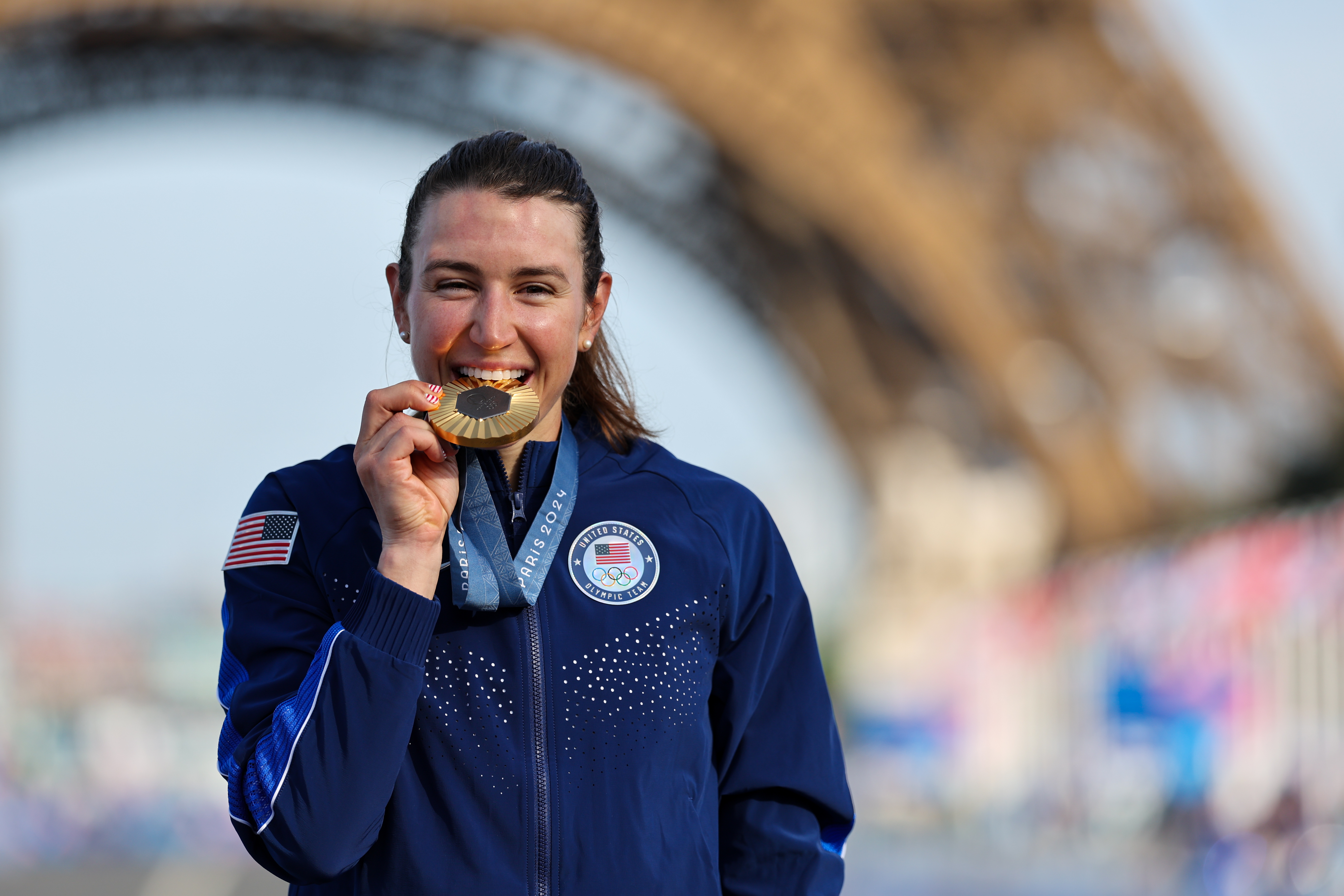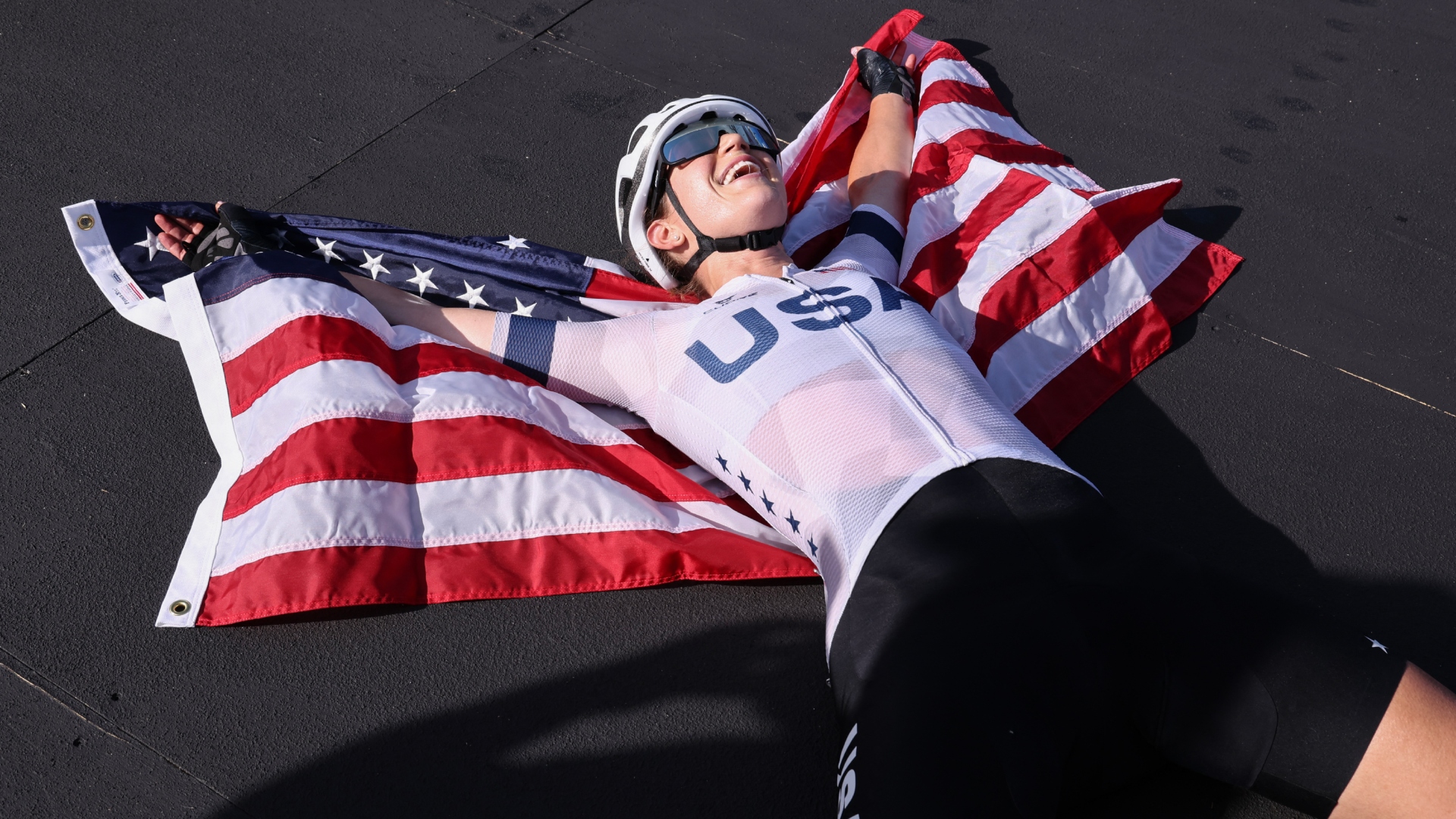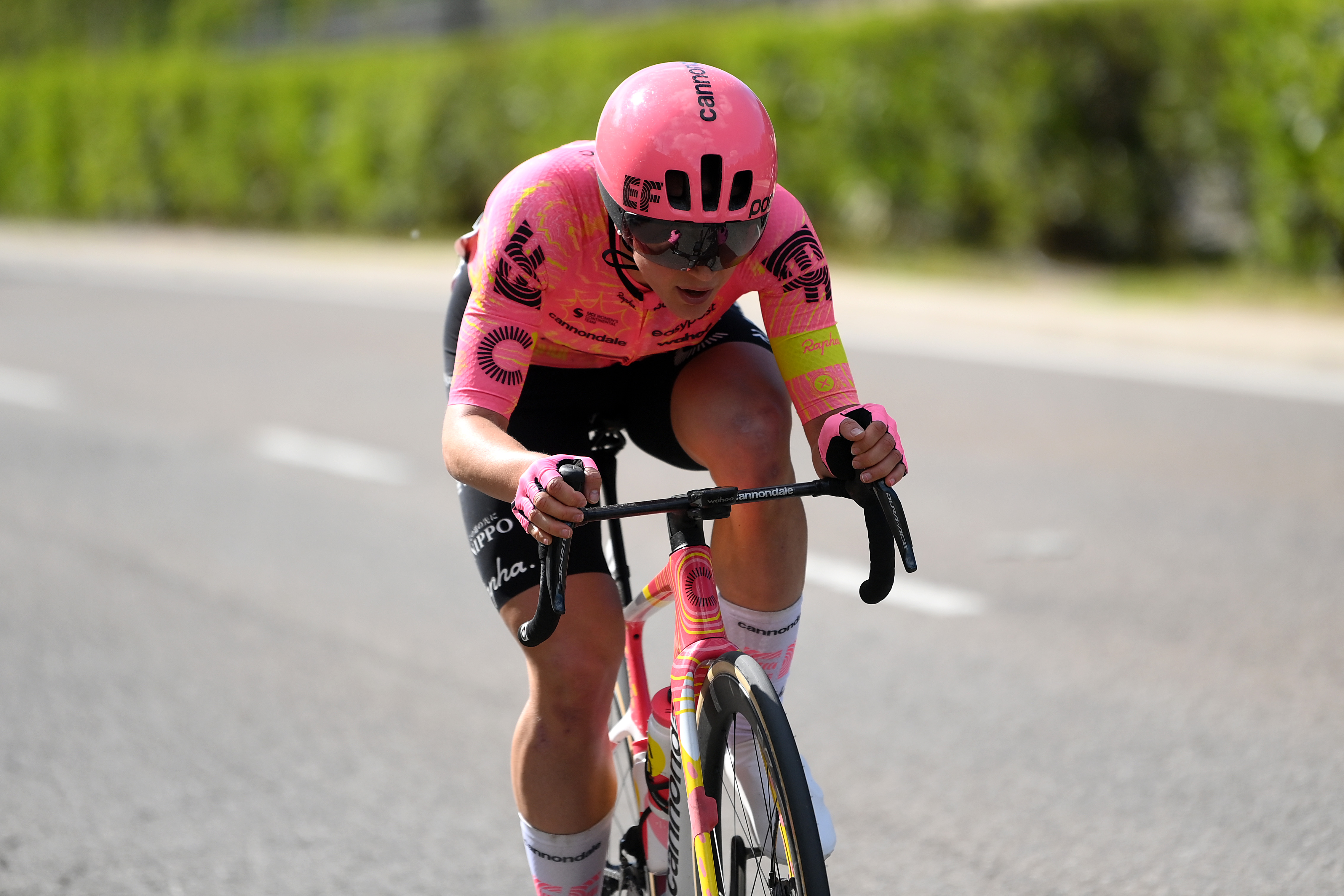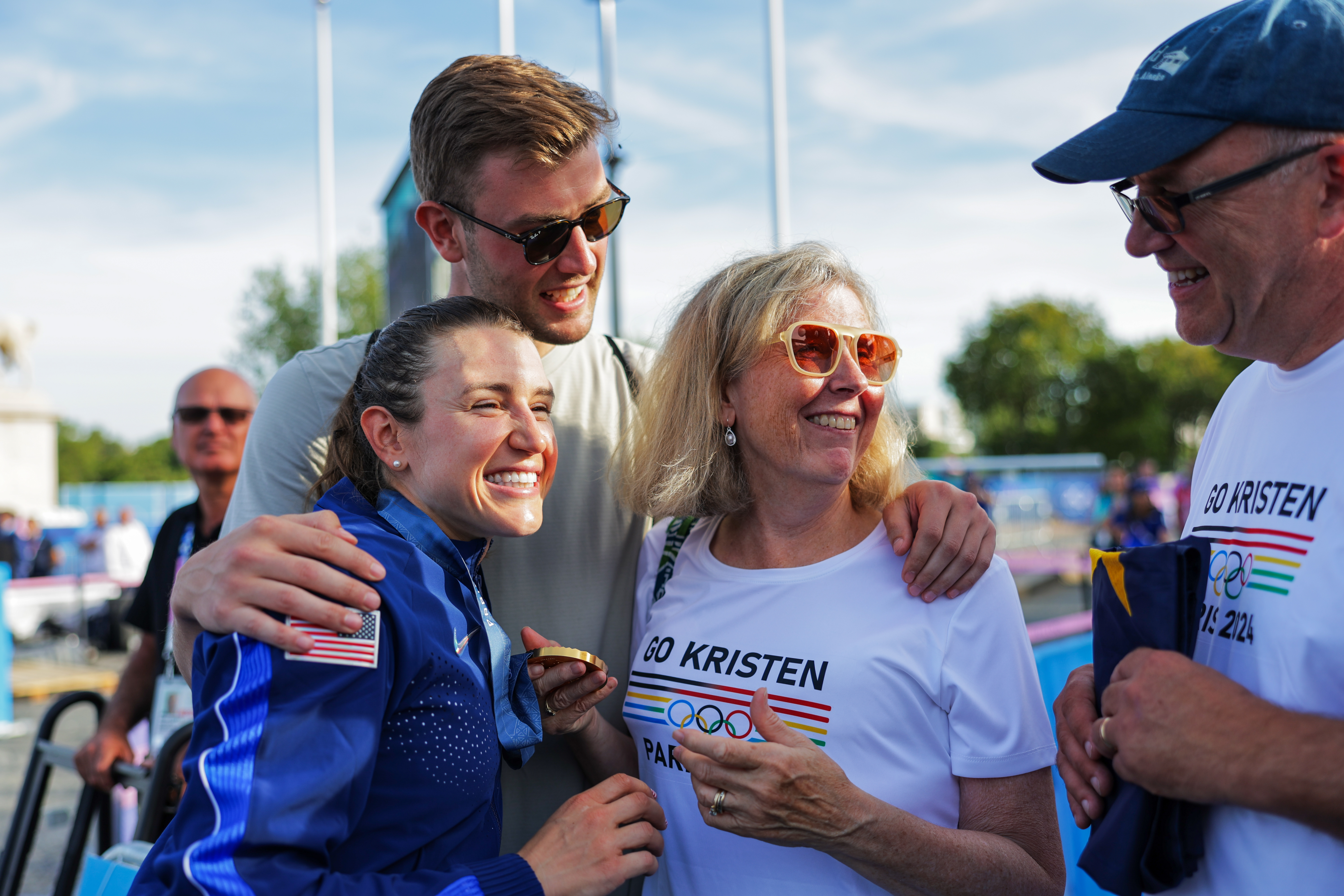
Kristen Faulkner is a double Olympic gold medallist and US national road champion. A former varsity rower, then venture capitalist, Faulkner only began riding a road bike in 2017. She turned pro in 2020, and currently rides for EF Education-Oatly. In 2024, she won the road race at the Paris Olympics, and three days later, won gold in the team pursuit on the track with her US teammates.
What was your first bike?
I think it was from Walmart and it was like a hardtail, a mountain bike without suspension, one of those big ones with flat handlebars and flat pedals. I think it cost $300 and I worked all summer as a housekeeper, cleaning toilets, so that I could buy it. I was so excited when I got it, I rode around town every day with my friend and I would ride around aimlessly, I had nowhere to go. I would ride to Pick-N-Pay, and I’d ride to the grocery store, but I didn’t even buy anything. I would just walk around the aisles. I’m from a small town in Alaska, so for me, the bike as a kid was a way to feel independent and like an adult.
Did you follow pro cycling when you were growing up?
No, I wasn’t into professional cycling until I started racing my bike after college. I had heard of the Tour de France back when Lance Armstrong was the heyday of American cycling, but I didn’t follow it besides that.
What other sports did you do?
I went to boarding high school in Massachusetts, and I was a swimmer and a runner. We had to do three trimesters, and we had to do a different sport every trimester – that was school policy. I ran cross country in the fall, I was a swimmer in the winter, and then in the spring, I decided I might as well try a New England sport, so I went into rowing and I really enjoyed it. I was really good at it.
Harvard had a really amazing rowing program, so it was a pretty easy decision to row in college. I rowed freshman year and senior year in the lightweight and heavyweight teams, and then competed in the Junior National Championships and World Championships, and placed second when I was 17. After college, I actually considered training for the Olympics for rowing, but it was really hard to fit that in with my job. I took some years off rowing, thinking that I would go back and prepare for the 2020 Olympics, but during that time I fell in love with cycling.

You were 24 when you bought your first road bike. What inspired you to take up cycling?
I was living in New York City and I really missed being part of a team sport from college. I was waking up every morning, going to the gym on the elliptical, going on a run, and I just felt that I missed the camaraderie and the community aspect of sports that had always been a pillar of my life.
My boyfriend at the time had this hand-me-down bike in his apartment, and he said, “Just borrow the bike. There’s a group ride, a community ride.” He was the one who urged me to go to this introductory women’s cycling clinic that was in Central Park. So I borrowed the bike – it was way too big for me, I think it had pedals you were supposed to clip into but I wore sneakers, and I showed up having no idea what I was doing. Once I went there, I was hooked. I loved it so much and never looked back. From that very first day, I just wanted to be as good as I could be.
When did the thought of turning pro really take hold?
The idea was there quite early. There was a woman, Evie Stevens, who had gone through the same cycling club in New York City, and she started cycling after college, really late. She went pro in Europe, and she was racing and was quite successful – she won Flèche Wallonne. When I won my very first race in Central Park, which maybe was a month into learning to clip in, there were some racers who said, “Oh, you’re the next Evie Stevens”. And I was like, "Who’s Evie Stevens?" Then I looked her up and I was like, "Wow this girl’s professional." I saw it as something that was possible. I didn’t think of it as something that was likely, but it gave me something to work towards, and to dream about from the very beginning.
At the time, you were working in venture capital. Are there any principles you’ve taken from that career and brought it into your approach to cycling?
So many things. The first one is being comfortable with taking risks. When I started cycling, a lot of people were really nervous to attack and go solo for these long-range attacks. For me, I have no problem with failure. If I attack and it doesn’t work out, I’ll try next time. It doesn’t phase me at all, it doesn’t hurt my ego. I think that because I spent my career investing in really high-risk start-ups, where many failed and many were wildly successful. I took that approach to racing: if I fail five times that’s fine, as long as I win a race eventually. It’s just about shots on goal.
The other one was the really interesting dynamic of being both an individual and a team. In venture capital, you work at a company, and usually the way it works is you get a certain percentage of the deals that you do, but you also get a return on deals that your team does. So you’re highly incentivised to be the best you can be, but also to help your teammates be the best they can be. Similarly, you have to work with other firms sometimes on a deal, because you might both be investors in a deal. You see that dynamic play out a lot in cycling.

Is there one race in particular that you look back on as a turning point in your career?
My very first stage in Europe, when I won a stage in Ardèche [in 2020]. I soloed to victory on stage four, and I had never raced in Europe before, so that was really big for me for a few reasons. The first thing was, as soon as I came to Europe, I got a taste of what it feels like to win, and that’s when I was like, "Wow, I really want to go win more races. I want to win bigger races." But it also told me that I belonged here. The second thing is that I won solo. It was in that race that my director told me to go away solo. At the time I thought, "Why? How could I possibly make it? I’m a beginner in Europe and I’m against all these amazing riders." When I went away solo, that kind of became my way to win from then on.
What is the proudest moment of your career?
Winning the Olympics. I remember hugging my parents and my little brother at the finish line – that was incredibly meaningful to me. My parents live in Alaska and it’s really hard for them to travel. They run a summer hotel, and it’s really busy in the summer, so for them to come over here and watch my race is really, really hard. It’s a really big deal and a sacrifice for them to come over. It’s not only far for them, but it also takes time away from their business, which is their income. Having them there to support me at the finish line was hugely meaningful for me.

What else would you like to achieve in your career?
I’m still figuring that out. I definitely have some smaller goals that I’m working towards in the near term: I want to win a stage at the Tour de France. I’ve won a stage at the Vuelta [Femenina], I’ve won a stage at the Giro [d’Italia Donne], but I need to kind of complete the triplet and win a stage at the Tour. At some point in the next few years, I’d like to win Strade Bianche and Milan San-Remo – those are my two favourite races on the calendar. I’d like to get on the podium at the World Championships in the time trial. I’d also like to win another two gold medals at the LA Olympics.
What do you like doing outside of cycling?
I love reading, I’m a huge reader. I’m currently writing a book about my cycling career, so that takes up a bit of time. I like going on date nights with my boyfriend, and I love to cook. I’m always looking at new recipes. I love to cook really healthy food, I try to find really healthy recipes that taste really good. I love doing an Asian stir fry – recently, I’ve been doing a lot of beef and broccoli. I also love to spend time outdoors during the off-season. I’ll go on a week-long hike, camping in the woods. That’s my happy place.
Kristen Faulkner's team, EF Education-Oatly, is sponsored by Wahoo. Go behind the scenes of the American's first race as Olympic champion with Wahoo's Embrace Every Moment series, available now on YouTube.







